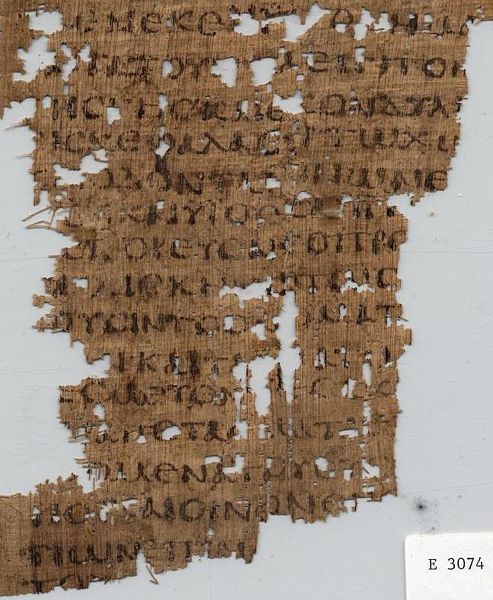By 600 A.D. Egypt was being run the Byzantine Roman empire (Constantine moved the seat of Roman rule to Byzantium in 330 A.D. and renamed it Constantinople). In 613, Mohammed started preaching, and the Muslim faith began to spread in Arabia. By 639 the Arabs were attacking all the lands around, to takeover and spread the religion. In 642 they entered a town on the upper Nile called Oxyrhynchus. (Incidentally, they never took down Constantinople until 1453, and important event in the development of European alchemy).
Oxyrhynchus had a library, one of the extended libraries of Alexandria. The invaders ransacked the library, and threw out anything they didn't want.
We have the documents they threw out. Many of them, anyway. Some perished or were carried off before the pile was covered over with dirt, presumably. They were discovered in 1869 and experts are still working to assemble and translate the fragments, having finished 1 - 2% of the total.
In those records, maybe half a million documents, were many civic and civil records: contracts, land deeds, legal documents, edicts, civil codes, sales and lease records, court documents, none bearing names we recognize. Only 10% is literary.
Of the literary documents we have some history, some mathematical texts, some Greek plays and poetry. Most of it's in Greek, some in Latin. There are Old Testament and New Testament verses. Sometimes even complete chapters. And there is new testament apocrypha and Gnostic texts.
Why is this extraordinary? It's what's missing that is important. The Greek philosophers are not there, particularly Aristotle and Plato. And there is no hint of alchemy. That's huge.
The absence of something is no proof of anything, but I can make some suppositions: Somebody thought they were valuable. Maybe it was the librarians who took them home for safekeeping. Maybe it was the Muslims who found them valuable. Maybe they were gone long before the Muslims arrived.
I favor the Muslims keeping them, based on the sections to come. The Muslim philosophers really got into and followed the Greek philosophy. They embraced it completely. Only after a couple hundred years did they begin to change it.
In alchemy we frequently refer to the "Arab alchemists." We don't really mean they were from Arabia, we mean they spoke Arabic. The philosophers and alchemists were from all parts of the Middle East: Syria, Babylon, Persia, Egypt. In fact, most Arabic-speaking alchemists were not from Arabia; only one or two were.

Papyrus Oxyrhynchus 846 (P. Oxy. 846 or E 3074) is a 6th-century
manuscript of a portion of the Greek version of the Hebrew Bible
(Tanakh or Old Testament) known as the Septuagint.